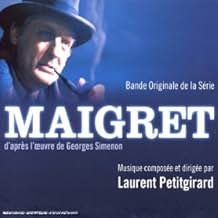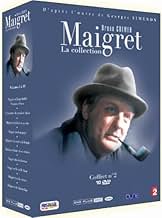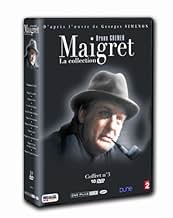Der pragmatische, zurückhaltende und raffinierte Maigret untersucht Morde auf seine einzigartig ruhige Art und Weise und findet unweigerlich die Wahrheit heraus.Der pragmatische, zurückhaltende und raffinierte Maigret untersucht Morde auf seine einzigartig ruhige Art und Weise und findet unweigerlich die Wahrheit heraus.Der pragmatische, zurückhaltende und raffinierte Maigret untersucht Morde auf seine einzigartig ruhige Art und Weise und findet unweigerlich die Wahrheit heraus.
- Auszeichnungen
- 1 wins total
Folgen durchsuchen
Empfohlene Bewertungen
I have only recently become familiar with Maigret and I am thrilled with the program. Hopefully I can find and watch all of the episodes.
Thank you...
Thank you...
Well......having recently obtained MhZ Choice thru Roku, will be able to do a sloooow binge-watch this whole Winter of my now recent favorite French detective, Maigret! I had seen bits and pieces on PBS, but MhZ has them all: all 9 years! Dragging out my special snacks, along with tooth-picks to prop up my eyelids and eye-drops to reduce the tell-tale redness, its going to be an occupied Winter fer shur! Deepest thanks to French television! Viva le France! I wonder if I'll be able to speak French when finished? EMBRACE the sub-Titles!
An excellent detective series for any nation, and yet I've seen a lot of them, ancient or modern.
Quickly, what differentiates this Maigret 1991 from other detective series is the atmosphere, the weightlessness and above all the reality that sticks to the skin of this universe.
Maigret is a gruff bear, certainly, but he has the gift of empathy: he loves people (even delinquents) and that can be seen on the screen.
Everyone has a chance with him: he takes his time to live with them, to live in the dirt, to live in the filth of this world in which he appears like a breath of air.
I like Bruno Cremer in this series because he is both human and the God of this world.
I'm more than tired of the series that we see too often in videos on demand, in which the houses don't have an ounce of dust, in which everything is smooth, all the actors are beautiful and all the investigations are solved with DNA.
No, that's not the truth.
The truth, the reality, is rather in the darkness and filth depicted by this series.
For me, it is masterful.
Quickly, what differentiates this Maigret 1991 from other detective series is the atmosphere, the weightlessness and above all the reality that sticks to the skin of this universe.
Maigret is a gruff bear, certainly, but he has the gift of empathy: he loves people (even delinquents) and that can be seen on the screen.
Everyone has a chance with him: he takes his time to live with them, to live in the dirt, to live in the filth of this world in which he appears like a breath of air.
I like Bruno Cremer in this series because he is both human and the God of this world.
I'm more than tired of the series that we see too often in videos on demand, in which the houses don't have an ounce of dust, in which everything is smooth, all the actors are beautiful and all the investigations are solved with DNA.
No, that's not the truth.
The truth, the reality, is rather in the darkness and filth depicted by this series.
For me, it is masterful.
There have been some outstanding portrayals of Maigret, the most recent Rowan Atkinson versions being quite good, but Bruno Cremer best invokes the spirit of books. Maigret is NOT a procedural, although they are certainly mysteries. They are about people and the human condition, best demonstrated by Maigret's compassion. Sometimes for victims, and yes, sometimes even for the criminals. If there is any failing at all in this fine series, it is the relative absence of his wife, who features more strongly in the books and some other versions. One of the most re-watchable series, I had depended on MHZ to view it and finally obtained a DVD set of the entire series. If you love mysteries, you simply can NOT skip over Maigret.
I know that I may be opening myself up to some fierce criticism but I absolutely am mezmerized by Bruno Cremer's portrayal of French detective, Maigret.
His subtlety makes me wonder what he is up to and then Bam!!! He'll open up into a fit of rage at a fellow detective or criminal. I love watching him smile and wish that he would give a more emotional reaction when he is pleased.
I missed the interaction with his wife about half way through the series. They were very 'human' snipets' of a very well protected set of emotions. Anyhow, as a couple they were cute!
I am on my third run through the series, consecutively. No gaps, just straight from the last episode to episode one!
I saw sad to find out that he had passed in 2010. For me a great actor portraying one of the greats in mystery/suspense.
His subtlety makes me wonder what he is up to and then Bam!!! He'll open up into a fit of rage at a fellow detective or criminal. I love watching him smile and wish that he would give a more emotional reaction when he is pleased.
I missed the interaction with his wife about half way through the series. They were very 'human' snipets' of a very well protected set of emotions. Anyhow, as a couple they were cute!
I am on my third run through the series, consecutively. No gaps, just straight from the last episode to episode one!
I saw sad to find out that he had passed in 2010. For me a great actor portraying one of the greats in mystery/suspense.
Top-Auswahl
Melde dich zum Bewerten an und greife auf die Watchlist für personalisierte Empfehlungen zu.
- How many seasons does Maigret have?Powered by Alexa
Details
Zu dieser Seite beitragen
Bearbeitung vorschlagen oder fehlenden Inhalt hinzufügen






























